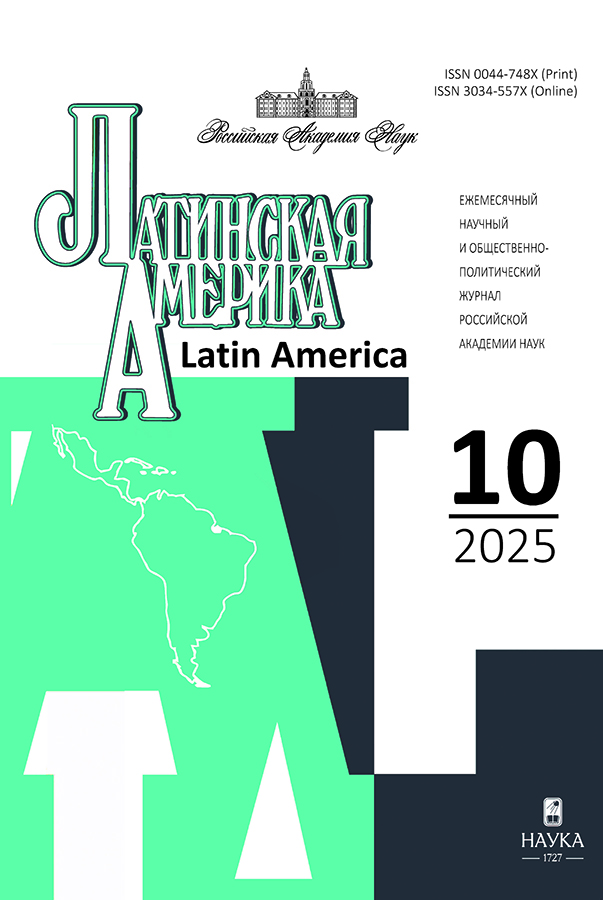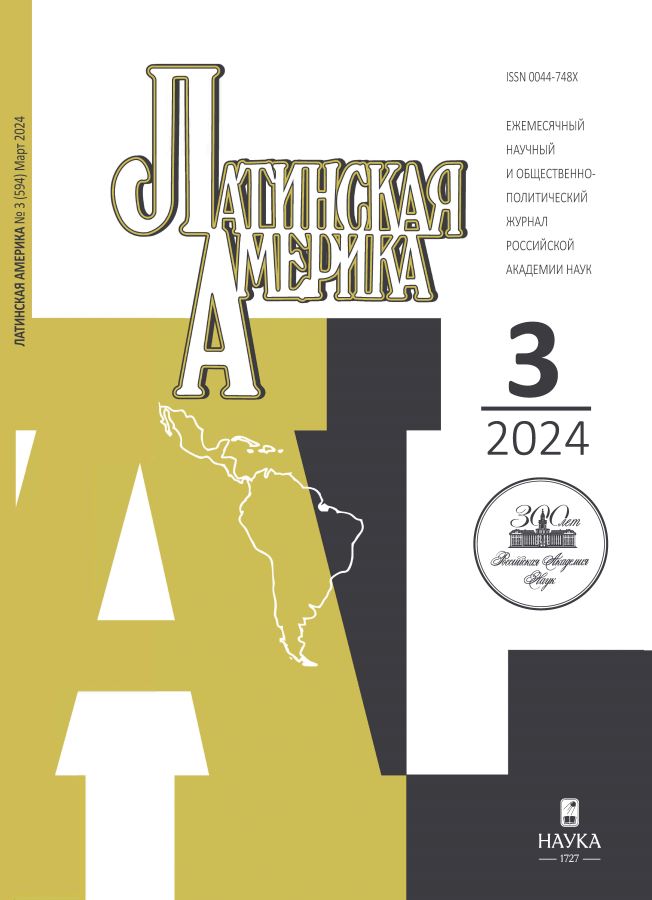Argentina on the trajectory of changing development models: challenges, answers, risks
- Authors: Yakovlev P.P.1,2, Yakovleva N.M.3
-
Affiliations:
- Institute of Latin American Studies, Russian Academy of Sciences
- Plekhanov Russian University of Economics
- Institute of Latin American Studies Russian Academy of Sciences
- Issue: No 3 (2024)
- Pages: 6-24
- Section: Economy
- URL: https://rjmseer.com/0044-748X/article/view/667949
- DOI: https://doi.org/10.31857/S0044748X24030014
- ID: 667949
Cite item
Abstract
The central issue of the presidential elections in Argentina in 2023, which attracted widespread international attention, was the choice of the path for further socioeconomic development in the context of severe crisis shocks within the country and ongoing global transformations. The electoral defeat of the Peronists in power brought an end to the long-term dominance of the state-centric (dirigiste) model. The victory in the second round of elections by the representative of the right-wing radical wing of the national political spectrum, economist Javier Milei, who assumed the presidency on December 10, 2023, opened a new stage in the history of Argentina, which means the transition of Peronism into opposition and the beginning of the stage of strengthening the market foundations of the economic model. However, the process of reforming of the Argentine economy on the principles of liberalism is associated not only with the dismantling of accumulated financial and economic rubble, but also with inevitable high social costs and significant political risks, which causes justified skepticism regarding the prospects for successful and complete implementation of the presidential program in the expert community.
Keywords
About the authors
Petr P. Yakovlev
Institute of Latin American Studies, Russian Academy of Sciences; Plekhanov Russian University of Economics
Email: petrp.yakovlev@yandex.ru
ORCID iD: 0000-0003-0751-8278
Doctor of Economics, Chief Researcher at Center of Iberian Studies; Professor at Department of International Business B. Ordynka Str., 21/16, 115035 Moscow, Russian Federation; Stremyanny lane, 36, 117997 Moscow, Russian Federation
Nailya M. Yakovleva
Institute of Latin American Studies Russian Academy of Sciences
Email: nel-yakovleva@yandex.ru
ORCID iD: 0000-0003-1707-6901
PhD in History, Senior researcher at the Center of Political Studies 21/16 B. Ordynka Str., 115035 Moscow, Russian Federation
References
- Can Argentina’s next president fix the economy? Don’t count on it. 19.10.2023. Available at: https://www.economist.com/the-americas/2023/10/19/can-argentinas-next-president-fix-the- economy-dont-count-on-it (accessed 06.12.2023).
- Rock D. Argentina 1516-1987: From Spanish Colonization to Alfonsín. Berkeley, University of California Press, 1987, 576 p.
- Graham-Yooll A. A State of Fear: Memories of Argentina’s Nightmare. London, Eland Books, 1986, 168 p.
- Pagni C. El Nudo. Por qué el conurbano bonaerense modela la política Argentina. Buenos Aires, Planeta, 2023. 776 p.
- Романова З.И. Развитие капитализма в Аргентине. М., Наука, 1985, 287 с.
- Яковлев П.П. Аргентинская экономика перед вызовами модернизации. М., ИЛА РАН, 2008. 472 с.
- Латинская Америка на пути экономической модернизации (отв. ред. Симонова Л.Н.). М., ИЛА РАН, 2013. 256 с.
- Давыдов В.М. Концептуальное позиционирование в русле регионоведения. Опыт латиноамериканистики и не только…М., Весь мир, 2023, с. 9.
- CEPAL. Perspectivas del Comercio Internacional de América Latina y el Caribe 2023. Cambios estructurales y tendencias en el comercio mundial y regional: retos y oportunidades. Santiago, Naciones Unidas, 2023. 185 p.
- Яковлев П.П., Яковлева Н.М. Латиноамериканский популизм: исторический контекст и современные тренды. Ибероамериканские тетради. 2022, т. 10, № 1, сс. 10-26.
- Carta de Perón al presidente de Chile, Gral Ibáñez del Campo. Available at: http://archivoperonista.com/documentos/correspondencia/1953/carta-peron-al-presidente-chi-le- gral-ibanez-campo/ (accessed 26.11.2023).
- Muchnik D. La patria financiera: El juego de la especulación. Buenos Aires, Grupo Editorial Norma, 2005. 302 p.
- Braun M., Llach L. Macroeconomía argentina. Buenos Aires, Alfaomega, 2006, 493 p.
- Яковлев П.П. Перед вызовами времени. Циклы модернизации и кризисы в Аргентине. М., Прогресс-Традиция, 2010, сс. 110-133.
- Kulfas M., Porta F., Ramos A. Inversiόn Extranjera y empresas transnacionales en la economía Argentina. CEPAL, Santiago, Naciones Unidas, 2002, 137 p.
- Россия и Аргентина на траектории взаимного сближения. К 130-летию российско- аргентинских отношений (отв. ред. П.П. Яковлев). М., ИЛА РАН, 2015, 130 с.
- Di Mauro J. A. Qué se vayan todos?: crόnica del derrumbe político. Buenos Aires, Corregidor. 2003, 477 p.
- Argentina – Salario Mínimo. Available at: https://datosmacro.expansion.com/smi/ar- gentina (accessed 07.12.2023).
- Goñi U. Argentina gets biggest loan in IMF’s history at $57bn. The Guardian. 27.09.2018.
- ITC. Trade map. Trade statistics for international business development. Bilateral trade between Latin America and Caribbean and China. Available at: https://www.trademap.org/ (accessed 01.12.2023).
- Яковлева Н.М. Конфигурация власти и риски внутренних конфликтов в Аргентине. Латинская Америка: политический ландшафт на фоне турбулентности. (Отв. ред. З.В. Ивановский). М., ИЛА РАН, 2022, сс. 234-258.
- Five countries with the highest inflation rate in the world in 2023. 23.01.2024. Available at: https://businessday.ng/news/article/here-are-top-five-countries-with-the-highest-inflation-rate-in-2023/ (accessed 25.01.2024).
- El plan “motosierra” de Javier Milei: todas las reformas neoliberales en una sola propuesta. Página/12, 27.06.2022.
- Malamud C. El tsunami de descontento que golpeό a Argentina. 20.11.2023. Available at: https://www.realinstitutoelcano.org/blog/el-tsunami-de-descontento-que-golpeo-a-argen-tina/ (accessed 30.11.2023).
- Яковлева Н.М., Яковлев П.П. Аргентинский прецедент: экономический кризис определил новое лидерство. Перспективы. Сетевое издание Фонда исторической перспективы. 22.11.2023. Available at: https://www.perspektivy.info/oykumena/amerika/ argentinskij_precedent_ekonomicheskij_krizis_opredelil_novoje_liderstvo_2023-11- 22.htm
- Diccionario del ajuste de Milei. Página/12. 01.12.2023.
- Raisbeck D. Milei’s Remarkable Victory in Argentina Panes the Way for a ‘Dollar Zone’. 19.11.2023. Available at: https://www.cato.org/blog/mileis-remarkable-victory-argentina-paves- way-dollar-zone (accessed 10.12.2023).
- Glustein F. Empresas públicas eficientes, estrategia de capitalismo maduro. Ámbito. 26.11.2023.
- Martín M. Mochila y multas, la reforma laboral “light” que los libertarios mostrarán al sindicalismo. Ámbito, 28.11.2023.
- ANSES. Creaciόn del Sistema Integrado de Jubilaciones y Pensiones (SIJP). 23.09.2023. Available at: https://www.anses.gob.ar/observatorio/creacion-del-sistema-integrado-de-jubila- ciones-y-pensiones-sijp (accessed 09.12.2023).
- Wolffelt P. Los ejes principals del plan econόmico de Javier Milei. Ámbito, 19.11.2023.
- Javier Milei: “El mejor Gobierno de la historia Argentina ha sido el de Carlos Saúl Menem”. 05.09.2021. Available at: https://www.canal26.com/politica/javier-milei-el-mejor- gobierno-de-la-historia-argentina-ha-sido-el-de-carlos-saul-menem--306533 (accessed 11.12.2023).
- Berensztein S. Milei, el neomenemismo y la conformaciόn de la coaliciόn del gobiernoю La Naciόn. Buenos Aires, 08.12.2023.
- Donovan F. Ni casta ni dolarizaciόn: Milei, un “leόn” herbívoro. La Naciόn. 24.11.2023.
- Medina F. El temprano balance económico de la era Milei. 25.01.2024. Available at: https://noticias.perfil.com/noticias/opinion/el-temprano-balance-economico-de-la-era-milei.phtml (accessed 26.01.2024).
- El Presidente Javier Milei envió al Congreso de la Nación la Ley de bases y puntos de Partida para La Libertad de los Argentinos. 27.12.2023. Available at: https://www.bole- tinoficial.gob.ar/detalleAviso/primera/301122/20231221 (accessed 25.01.2024).
- Vásquez I. Argentina Is One of the Most Regulated Countries in the World. 22.12.2023. Available at: https://www.cato.org/blog/argentina-one-most-regulated -countries-world (accessed 24.01.2024).
- Manuel Adorni: “No hay una negociación sobre la Ley Ómnibus”. 18.01.2024. Available at: https://cnnespanol.cnn.com/radio/2024/01/18/manuel-adorni-no-hay-una-negociacion-sobre-la-ley-omnibus/ (accessed 25.01.2024).
- Milei y Argentina: ¿amarga luna de miel? 12.01.2024. Available at: https://www.americaeconomia.com/economia-y-mercados-politica/milei-y-argentina-amarga-luna- de-miel (accessed 23.01.2024).
- Obario M. Primera y dolorosa derrota política: Milei, obligado a dar un manotazo de ahogado para salvar la Ley ómnibus. 27.01.2024. Available at: https://es- us.finanzas.yahoo.com/noticias/dolorosa-derrota-política-milei-obligado-002000793.html (accessed 27.01.2024).
- La Sociedad Rural se posiciona ante el Gobierno de Milei: “Estamos muy conformes” Ámbito. 25.11.2023.
- Roberto Cacciola, de CAEM: "En minería necesitamos transformar potencial en realidad". Ámbito. 27.11.2023.
- Яковлев П.П. Экономика Латинской Америки на старте цифровой модернизации. Мировая экономика и международные отношения, 2022, т. 66, № 3, сс.110-118.
Supplementary files










